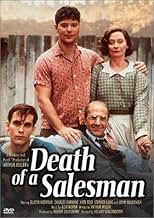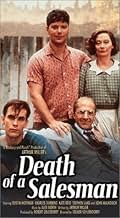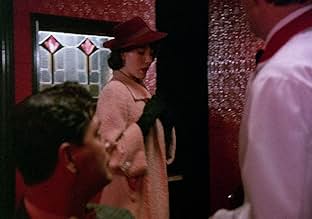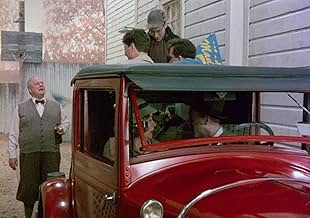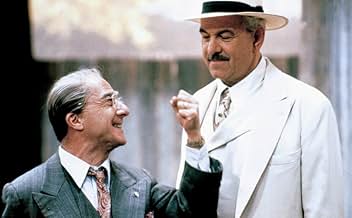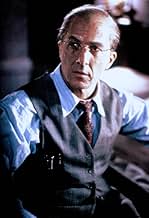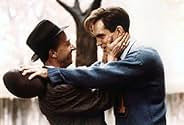VALUTAZIONE IMDb
7,2/10
12.162
LA TUA VALUTAZIONE
Un vecchio venditore riconosce il vuoto della sua vita e cerca di rimediare.Un vecchio venditore riconosce il vuoto della sua vita e cerca di rimediare.Un vecchio venditore riconosce il vuoto della sua vita e cerca di rimediare.
- Vincitore di 3 Primetime Emmy
- 7 vittorie e 12 candidature totali
David Chandler
- Bernard
- (as David S. Chandler)
Kathryn Rossetter
- Woman from Boston
- (as Kathy Rossetter)
Recensioni in evidenza
Arthur Miller's compelling work is deftly translated to the small screen here, with riveting performances by Dustin Hoffman as Willy Loman, Kate Reid as Willy's wife Linda, and John Malkovich as the prodigal son Biff. This work touches my soul on several levels: sympathy for the fallen man Willy, understanding of the difficulty of both hating your father and wanting him to be proud of you as Biff shows, and the ever-protective enabler Linda, who defends Willy even as she sees him failing before her eyes. Miller took a simple American family struggling to make life work, and made each character in their own way extraordinary.
'Death of a Salesman' is a well-made, well-told story, but above it's merits as a story, it's the performances by it's actors, Dustin Hoffman & John Malkovich, that stand out & shine the brightest.
'Death of a Salesman' Synopsis: An aging traveling salesman recognizes the emptiness of his life and tries to fix it.
Based on the 1949 play of the same name by Arthur Miller, 'Death of a Salesman' succeeds by becoming an absorbing cinematic tale as well. It efficiently structures the story of an aged man, who is on the verge of killing himself. The Writing Material is engaging & very human, if I may say so. Volker Schlöndorff Directs this story, with maturity.
Hoffman & Malkovich, as mentioned before, stand out with their performances & shine the brightest, they overshadow the narrative, to a large extend. Hoffman is astonishing as an aging traveling salesman, while Malkovich is magnificent as his troubled son. They both deliver legendary, unforgettable performances, that deserve immense praise. Among other performers, Kate Reid does exceedingly well as the wife of the salesman.
On the whole, A story worth watching, with 2 impeccable performances coming in-tact with it.
'Death of a Salesman' Synopsis: An aging traveling salesman recognizes the emptiness of his life and tries to fix it.
Based on the 1949 play of the same name by Arthur Miller, 'Death of a Salesman' succeeds by becoming an absorbing cinematic tale as well. It efficiently structures the story of an aged man, who is on the verge of killing himself. The Writing Material is engaging & very human, if I may say so. Volker Schlöndorff Directs this story, with maturity.
Hoffman & Malkovich, as mentioned before, stand out with their performances & shine the brightest, they overshadow the narrative, to a large extend. Hoffman is astonishing as an aging traveling salesman, while Malkovich is magnificent as his troubled son. They both deliver legendary, unforgettable performances, that deserve immense praise. Among other performers, Kate Reid does exceedingly well as the wife of the salesman.
On the whole, A story worth watching, with 2 impeccable performances coming in-tact with it.
I had to read Arthur Miller's Death of a Salesman` for my English class this year. Our teacher was a very industrious woman and let us analyze every character's every word several times, until we couldn't hear the words Willy`, Linda`, Biff`, American Dream` and stockings` any more. It was terrible! She didn't show us any theater or film version, so we began to utterly dislike the text as a whole: a sentimental play where you already know the ending when you read the title.
A few days ago, I spotted Volker Schlöndorff's film version on television, a German dubbed version, but that doesn't matter because I already knew the lines and Schlöndorff hardly changed them.
Fortunately, Schlöndorff didn't make any effort to put his own special style into the movie, he just left the play the way it was and the way, I suppose, Arthur Miller wanted it. So some of you might claim that this version was too stage-drama-like, not cinematic. For me, this was ideal because I could see the REAL, lively Death of a Salesman`, played by an ideal cast: Dustin Hoffman: a little over-acting, but enthusisiastic; Kate Reid: so authentic that she could be taken for my mother; John Malkovich: silent, thoughtful, self-confident`, great! How shall I put it? This film sort of opened my eyes towards this great, merciless work of Arthur Miller. This play is something you can orientate your life to. At many important turning points of your life, you can remember Willy Loman and his fate that is fictitious but and believe me, I know some people who are exactly like him definitely could be the fate of a real person, and not only of an American. I found the Salesman` important, not as much as a criticism of the American Dream but an account of what must happen, if lives are built upon lies lies to others and lies to yourself. Those people who think Death of a Salesman` is rubbish are those who suppress cruel truths just as Willy Loman does.
So, when I saw this movie, I was completely stunned because its hopelessness became clear to me and I noticed how crucial this American classic really is. I give Schlöndorff 8 out of 10 stars because there are some flaws in his way of directing (e. g. letting Malkovich and Lang play their young alter egos was stupid because no one believes that they are 17).
Another sad example how bad teachers can destroy a masterpiece. Shame on you, Mrs. H.!
A few days ago, I spotted Volker Schlöndorff's film version on television, a German dubbed version, but that doesn't matter because I already knew the lines and Schlöndorff hardly changed them.
Fortunately, Schlöndorff didn't make any effort to put his own special style into the movie, he just left the play the way it was and the way, I suppose, Arthur Miller wanted it. So some of you might claim that this version was too stage-drama-like, not cinematic. For me, this was ideal because I could see the REAL, lively Death of a Salesman`, played by an ideal cast: Dustin Hoffman: a little over-acting, but enthusisiastic; Kate Reid: so authentic that she could be taken for my mother; John Malkovich: silent, thoughtful, self-confident`, great! How shall I put it? This film sort of opened my eyes towards this great, merciless work of Arthur Miller. This play is something you can orientate your life to. At many important turning points of your life, you can remember Willy Loman and his fate that is fictitious but and believe me, I know some people who are exactly like him definitely could be the fate of a real person, and not only of an American. I found the Salesman` important, not as much as a criticism of the American Dream but an account of what must happen, if lives are built upon lies lies to others and lies to yourself. Those people who think Death of a Salesman` is rubbish are those who suppress cruel truths just as Willy Loman does.
So, when I saw this movie, I was completely stunned because its hopelessness became clear to me and I noticed how crucial this American classic really is. I give Schlöndorff 8 out of 10 stars because there are some flaws in his way of directing (e. g. letting Malkovich and Lang play their young alter egos was stupid because no one believes that they are 17).
Another sad example how bad teachers can destroy a masterpiece. Shame on you, Mrs. H.!
Superb portrayal of tragic characters. One can sense the futility, frustration, and disappointment of Loman. As we age and our faculties deteriorate along with unrealized dreams, it is easy to grasp for hope even where none exists and transfer our aspirations to the next generation only to have them carry your faults and failings in addition to their own. Profoundly sad but unfortunately that is the reality for countless billions of the human race. 8/10.
Because of its complex nature, its many morals, its non-linear flashbacks, and its over-the-top characters, I express extreme doubts when believing that Arthur Miller's renowned Death of a Salesman was meant to be read. The iconic play has won several awards, was performed in the 1940's over seven-hundred times resulting in four revivals on Broadway, and has continued to be translated and performed in countries other than the United States, where it originated. For a play, the story of Willy Loman's dysfunctional family has had unprecedented success. As a film, it has had its share of setbacks.
To my knowledge, never has a theatrical production of the film been made, which is depressing to note, seeing as directors like Roman Polanski have proved that they can transition a play to a screen-production with little to no constraints. What we were fortunate to get were not only several low-budget, TV renditions of the story Death of a Salesman, but we are grateful to get a telling of the story on film, written by the original author, Arthur Miller, made for the CBS network in September 1985. The story is kept the same, albeit some metaphorical and symbolical changes, as it revolves around Willy Loman, a naive, broken man who has failed at the game of life and business and has halted his family's growth because they are so committed to either boosting their leader's confidence or keeping him from sinking.
Willy's long suffering wife is Linda, played by Kate Reid, a miserable, shell of a woman so determined to help her husband through uncertain times she's forgotten how to help and better herself. Their two sons are two equally broken men living at home well into their thirties. They are Biff (John Malkovich, a gifted actor, who gave a terrific performance as Lenny in another acclaimed novel, Of Mice in Men in 1992), a football star brought down by the weight of his failure of a father, and Happy (Stephen Lang), a cocky ladies man replicating who Willy the characteristics Willy once gleefully held; brashness, confidence, and the ability to strike a deal.
The main problem with Willy is his naivety towards the business world and to himself; he continues to convince himself that the only thing necessary to succeed in business is a firm handshake and a high likability factor. By doing this, he convinces himself that by possessing those very important traits he can do anything, and yet he hasn't. He is roadblocked by not only that, but by his falsifying sense of optimism, telling himself and everyone around him that he is "not a dime a dozen" but Willy Loman, a unique individual. He is only more upset when he sees how his best friend Charley (Charles Durning) and brother Ben (Louis Zorich) have gone on to lead happy, successful lives with limitless wealth and opportunities, and he is confined to his cramped apartment, told to be himself which does nothing but let everyone down.
Willy is portrayed by Dustin Hoffman, a character actor with a barrage of films under his belt. Hoffman's performance of Willy is definitely admirable, but it isn't as layered as one would hope. He is written efficiently as a character victim by his own delusions, but several times does Hoffman seem like he is teetering on the lines of self-parody rather than seriousness, almost the equivalent to a Woody Allen archetype. Nonetheless, he is completely capable in this role, and when he hits the right notes, specifically in Charlie's office and during Willy's final monologue with the family (more commonly known as his "dime a dozen" speech), he truly shows what power and strength he brings to the table.
But perhaps the film can be known for not just taking a complex, theme-driven play and creating it into a very, very intriguing film, but also for bringing more style to a made-for-TV movie than anyone ever expected. The replication of the inherent seamy, humidity-soaked New York atmosphere is stunningly portrayed, with Willy Loman's listless agenda to only heighten the gloomy setting. The other aspect is the way the filmmakers constructed the environment. I've read that the set of Death of a Salesman is mainly composed of an old play setting, most likely from a version of the play, meaning several buildings don't have roofs, several backdrops are artificial, and several background buildings are one-dimensional cutouts designed to only give the look of the environment. This isn't as disconcerting as it sounds, but it livens the film to a new height, making it closer to the feeling of an actual play rather than abandoning the stage-feel to favor a more polished cinematic feel.
Schlöndorff's directorial efforts to make Death of a Salesman a functioning film and playwright Arthur Miller taking his personal material into his own hands to give fans and newcomers the version he wants on screen have both worked wonderfully. This is a complex picture, doing different things for different people and showing each person a different theme or meaning. Whether it be a commentary on the business world, a tragic story of a once-successful businessman who was never "once-successful," a picture showing an American's tragic existence, a failed American Dream, an insight into the tragic hero, or how one man can collectively bring down his entire family by his own delusional self, this is a gripping story made into a surprisingly efficient film with performances of impact and style to laud.
Starring: Dustin Hoffman, Kate Reid, John Malkovich, Stephen Lang, Charles Durning, and Louis Zorich. Directed by: Volker Schlöndorff.
To my knowledge, never has a theatrical production of the film been made, which is depressing to note, seeing as directors like Roman Polanski have proved that they can transition a play to a screen-production with little to no constraints. What we were fortunate to get were not only several low-budget, TV renditions of the story Death of a Salesman, but we are grateful to get a telling of the story on film, written by the original author, Arthur Miller, made for the CBS network in September 1985. The story is kept the same, albeit some metaphorical and symbolical changes, as it revolves around Willy Loman, a naive, broken man who has failed at the game of life and business and has halted his family's growth because they are so committed to either boosting their leader's confidence or keeping him from sinking.
Willy's long suffering wife is Linda, played by Kate Reid, a miserable, shell of a woman so determined to help her husband through uncertain times she's forgotten how to help and better herself. Their two sons are two equally broken men living at home well into their thirties. They are Biff (John Malkovich, a gifted actor, who gave a terrific performance as Lenny in another acclaimed novel, Of Mice in Men in 1992), a football star brought down by the weight of his failure of a father, and Happy (Stephen Lang), a cocky ladies man replicating who Willy the characteristics Willy once gleefully held; brashness, confidence, and the ability to strike a deal.
The main problem with Willy is his naivety towards the business world and to himself; he continues to convince himself that the only thing necessary to succeed in business is a firm handshake and a high likability factor. By doing this, he convinces himself that by possessing those very important traits he can do anything, and yet he hasn't. He is roadblocked by not only that, but by his falsifying sense of optimism, telling himself and everyone around him that he is "not a dime a dozen" but Willy Loman, a unique individual. He is only more upset when he sees how his best friend Charley (Charles Durning) and brother Ben (Louis Zorich) have gone on to lead happy, successful lives with limitless wealth and opportunities, and he is confined to his cramped apartment, told to be himself which does nothing but let everyone down.
Willy is portrayed by Dustin Hoffman, a character actor with a barrage of films under his belt. Hoffman's performance of Willy is definitely admirable, but it isn't as layered as one would hope. He is written efficiently as a character victim by his own delusions, but several times does Hoffman seem like he is teetering on the lines of self-parody rather than seriousness, almost the equivalent to a Woody Allen archetype. Nonetheless, he is completely capable in this role, and when he hits the right notes, specifically in Charlie's office and during Willy's final monologue with the family (more commonly known as his "dime a dozen" speech), he truly shows what power and strength he brings to the table.
But perhaps the film can be known for not just taking a complex, theme-driven play and creating it into a very, very intriguing film, but also for bringing more style to a made-for-TV movie than anyone ever expected. The replication of the inherent seamy, humidity-soaked New York atmosphere is stunningly portrayed, with Willy Loman's listless agenda to only heighten the gloomy setting. The other aspect is the way the filmmakers constructed the environment. I've read that the set of Death of a Salesman is mainly composed of an old play setting, most likely from a version of the play, meaning several buildings don't have roofs, several backdrops are artificial, and several background buildings are one-dimensional cutouts designed to only give the look of the environment. This isn't as disconcerting as it sounds, but it livens the film to a new height, making it closer to the feeling of an actual play rather than abandoning the stage-feel to favor a more polished cinematic feel.
Schlöndorff's directorial efforts to make Death of a Salesman a functioning film and playwright Arthur Miller taking his personal material into his own hands to give fans and newcomers the version he wants on screen have both worked wonderfully. This is a complex picture, doing different things for different people and showing each person a different theme or meaning. Whether it be a commentary on the business world, a tragic story of a once-successful businessman who was never "once-successful," a picture showing an American's tragic existence, a failed American Dream, an insight into the tragic hero, or how one man can collectively bring down his entire family by his own delusional self, this is a gripping story made into a surprisingly efficient film with performances of impact and style to laud.
Starring: Dustin Hoffman, Kate Reid, John Malkovich, Stephen Lang, Charles Durning, and Louis Zorich. Directed by: Volker Schlöndorff.
Lo sapevi?
- QuizDustin Hoffman called this his favorite acting experience.
- BlooperWhen Willy comes out of his flashback in the bathroom of Frank's Chop House, the close up shot shows a drink on the toilet seat. When the shot shifts behind the entering waiter, the drink is gone.
- Citazioni
Biff Loman: I run out of that building and I see... the sky. I see all the things I love in this world. The work, the food, the time to sit and smoke. And I look at this pen and I ask myself, "What the hell am I grabbing this thing for? Why am I trying to become something I don't wanna become when all I want is out there waiting for me the minute I say I know who I am?"
- ConnessioniFeatured in American Masters: Arthur Miller: Private Conversations (1985)
I più visti
Accedi per valutare e creare un elenco di titoli salvati per ottenere consigli personalizzati
Dettagli
- Data di uscita
- Paese di origine
- Sito ufficiale
- Lingua
- Celebre anche come
- Death of a Salesman
- Luoghi delle riprese
- Aziende produttrici
- Vedi altri crediti dell’azienda su IMDbPro
Contribuisci a questa pagina
Suggerisci una modifica o aggiungi i contenuti mancanti

Divario superiore
By what name was Morte di un commesso viaggiatore (1985) officially released in Canada in English?
Rispondi

